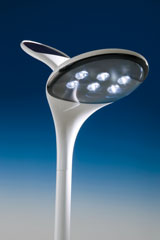Oct 21 2010
Thanks to their low energy consumption, low maintenance requirements and long service life, LED light technologies will soon supplant traditional lighting systems. To this end, Bayer MaterialScience has developed customized polycarbonates for this field which are now proving their mettle in initial series applications. Some examples from the automotive industry include LED lenses for low-beam and full-beam headlights and fiber optics for daytime running lights in the front headlamps of the new Audi A8.
The components were developed in collaboration with Audi AG and Hella KGaA Hueck & Co. The ten plastic lenses used in the headlamp are made from Makrolon® LED 2245, which boasts high transmission for long light paths, high thermal resistance and excellent yellowing stability to LED light.
"Our material meets the high optical requirements for exposed headlamp parts and is within the narrow color tolerance range. It also enables enhanced design freedom and a considerable weight reduction. LED lenses are around 50 percent lighter than their glass counterparts," explains Dr. Martin Döbler, an expert in optical polycarbonate applications at Bayer MaterialScience.
 Polycarbonate – material of choice for innovative lights and lighting concepts.
Polycarbonate – material of choice for innovative lights and lighting concepts.
Significant weight reduction ahead of the front axle
This weight-saving opportunity is fully in line with the trend to electric vehicles. To ensure that small vehicles, too, can be powered by batteries that are still very heavy, the cars themselves have to be lightweight, which forces manufacturers to cut down on weight wherever possible. "With small vehicles, too, interest in lightweight LED headlamp lenses and other optical headlamp components made of polycarbonate is soaring," says Döbler. What’s more, the weight reduction from these components is achieved ahead of the front axle, a fact that has a positive effect on vehicle dynamics. LED headlamps also use less energy, which places less load on the battery.
Multi-layer injection molding - process of choice
The rectangular, slightly curved LED headlamp lenses for the Audi A8 are 4 cm long, 2 cm wide and 1 cm thick. Because of the complex shape and thick walls of the optical components, it is no longer economically viable to produce them by the standard injection molding process. Bayer MaterialScience therefore set about improving its multi-layer injection molding process. This and other techniques for mold temperature control are now so sophisticated that high-precision LED lenses with walls of greatly varying thickness can be manufactured in short cycles while achieving a high degree of dimensional stability for the components. "Together with Hella, we have successfully carried out injection molding trials to produce plastic LED lenses on equipment at our Leverkusen Technical Service Center. These trials confirmed that LED headlamp lenses produced using these technologies tick all the right boxes," says Christoph Klinkenberg, a specialist in processing Makrolon® at Bayer MaterialScience.
New concept - LED street lights for towns of the future
Bayer MaterialScience’s experience in the field of polycarbonate LED lenses has also been incorporated into a study on street lamps using LED lenses made of Makrolon®. The concept was drawn up in conjunction with Cologne-based agency DESIGNquadrat GbR. It came about as a result of public-sector efforts in many European countries to reduce the high costs of powering traditional street lights, of which there are 27 million in operation throughout Europe. Almost all major international light manufacturers are therefore working on concepts for LED street lamps.
The defining feature of the study is the futuristic design of the lamps with their two-leaf floral shape. A photovoltaic cell integrated in the leaf pointing towards the sun further reduces the amount of energy drawn from the public electricity grid to power the lamps, which is already low thanks to the LED technology. The other leaf incorporates six LEDs with one lens each. "The design of the LED lenses shows that, compared with glass, polycarbonates offer much greater design freedom for precision optical parts," explains Dr. Klaus Reinartz, head of the global LED project for general lighting at Bayer MaterialScience. Other advantages of polycarbonate include its high heat resistance and high break and shatter resistance, which protects the LED lamps against vandalism. Bayer MaterialScience also offers LED lenses made of flame-retardant polycarbonate grades. Furthermore, it has a wide range of customized polycarbonates and polycarbonate blends for LED lamp covers and housings. These range from transparent and opaque (e.g. light-diffusing) materials to non-transparent (e.g. highly reflective) materials.
Fit for outdoors - LEDs encased in polycarbonate tubes
Polycarbonates are ideal for long-term outdoor use in LED lamps, as demonstrated by a new Bayer office building in Diegem near Brussels. On its north side, it has an LED wall - 80 meters long and two meters high - on which, for example, the company logo can be seen from far and wide in animated color images. The images are created using horizontal LED ropes based on the modular curveLED® system from Dusseldorf-based company curveLED® GmbH. The LED ropes are encased in tubes made of a transparent, UV-stabilized Makrolon® grade. "A total of 448 meters of this shatterproof, highly transparent tubing is used to protect the LED ropes effectively against inclement weather, such as hail. In doing so, it fulfils, for instance, the requirements of protection class IP65 (International Protection)," explains Reinartz. In this application, too, polycarbonate has the advantage of being much lighter than glass and, unlike glass, can be extruded.